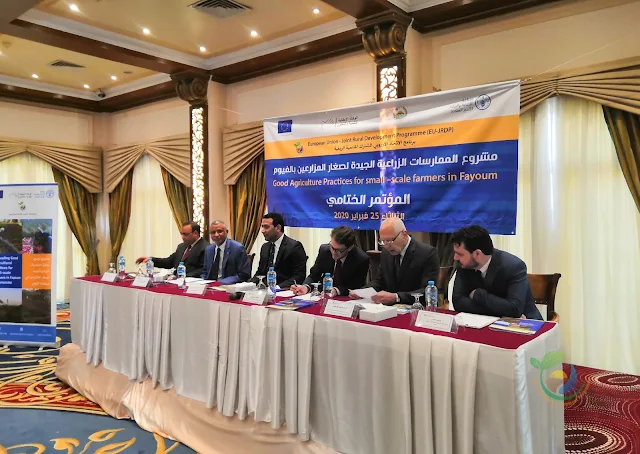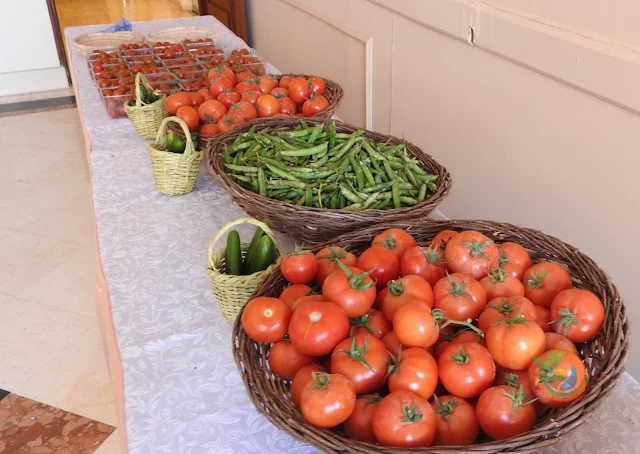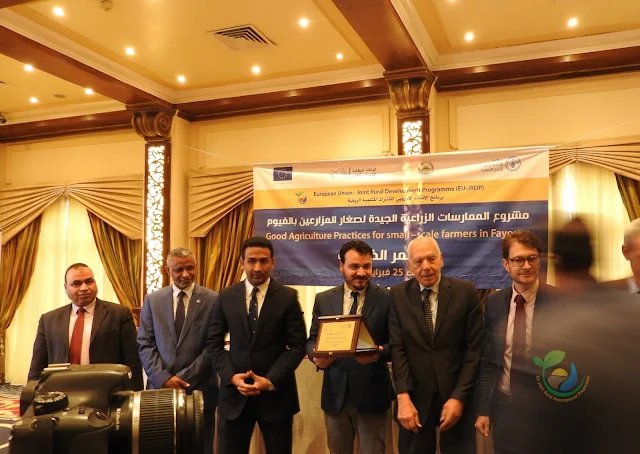Looking back to FAO closing event last month dated February 25th on “Good Agricultural Practices for Sustainable Improvement of the Quality and Quantity of Horticultural Production of Small-scale Farmers in Fayoum". Attended by the following Representatives: The European Union The Governor of Fayoum, Undersecretary of Agriculture in Fayoum, European Union's Joint Rural Development Program FAO The Italian Agency for Cooperation and Development Beneficiaries and representatives of agricultural cooperatives, agricultural extension centers in the province, small farmers.
In addition to the difficulties small holders face in obtaining fertilizers, the access to quality seeds is also limited. Most farmers purchase seeds from private suppliers who mix different qualities of seeds together to maximize their profit. Consequently, the resulting crops are mixed and inferior which has an adverse effect on the yield of each feddan planted. Crop diversification is also generally lacking. Farmers tend to grow the crops they are traditionally used to plant. This could lead to decreased land fertility, increased risk of being attacked by pests, increased vulnerability to climatic changes, this is to name a few drawbacks. Also, there is lack of availability of agriculture machinery in the Agriculture Cooperatives which constitutes a major problem for small land holders as they must resort to privately owned machines that are rented by the hour at relatively high prices particularly for poor farmers. Those farmers who cannot afford to rent equipment must resort to manual methods and this adversely affects crop yields as well as the quantities of water used since land levelling is an important factor in efficient water management.
Objectives
The overall goal of this project is to improve the living condition of small-scale horticulture farmers in the five target villages in Fayoum governorate through increasing the competitiveness of their production and thus enhance the economic status of the rural poor especially small-scale horticultural growers through a participatory based development approach to promote the adoption of GAP related to the efficient use of land and water among the target beneficiaries.
FAO implemented this project in cooperation with the Ministry of Agriculture and Land Reclamation, the Faculty of Agriculture at the University of Fayoum, the Horticultural Producers and Exporters Union and the Fayoum Organic Agriculture Development Association, with funding from the European Union's Joint Rural Development Programme, in coordination with the Italian Agency for Development Cooperation. Participants of the project’s final workshop included representatives of The Governor of Fayoum, Dr. Ahmed ElAnsari, Secretary General and Deputy Governor, Dr. Mohamed Emad, Dr. Rabie Mohammed Mustafa, Undersecretary of Agriculture in Fayoum, as well as representatives of the European Union's Joint Rural Development Program, the Italian Agency for Cooperation and Development, beneficiaries and representatives of agricultural cooperatives, agricultural extension centers in the province, small farmers and media.
The project is considered as one of the milestones in the development process in the province for having succeeded in supporting the people of Dar ElSalaam, Fanous, Najib Sharq, Youssef El-Siddiq and Qasr Jebali, the targeted villages in Al-Fayoum governorate.
In his opening words at the closing workshop, Dr. Ahmed Al Ansari, Governor of Fayoum, said in a speech delivered on his behalf by his deputy, Mohammed Emad: "The training efforts obtained by the beneficiaries of the project should be utilized and shared with the rest of the farmers, where we are currently seeking to achieve integration. Between the directorates of agriculture and irrigation and the reliance on the application of good agricultural practices and modern irrigation systems, we call on FAO and the EU to continue to provide support and ensure that the integration component of the projects is achieved to include all the required components starting from soil analysis and selection process as well as marketing operations".
Nasreddine Haji Al-Amin, FAO representative in Egypt, said: “The project achieved many objectives and provided, the people of the targeted villages in Fayoum, the opportunity to benefit from modern agricultural techniques in the cultivation of their crops and agricultural products, which contributes to improving the living conditions of small farmers and improving their economic conditions, which comes in-line with FAO's objectives to end hunger and improve food security and standards of living".
The objectives of the project were to improve the livelihoods of small horticultural farmers in the five targeted villages in Fayoum governorate by increasing the competitiveness of their production, thereby improving their economic conditions by adopting a participatory development approach that encourages reliance on Good Agricultural Practices related to land and water efficiency among targeted small farmers.
Raphael Demoler, the EU’s Attache on Social and Rural Development, said: The European Union's joint rural development programme focuses on updating the value chain, developing irrigation systems, promoting geographical indicators of agricultural products and promoting good agricultural practices, emphasizing the strong participation of women that the project has developed. "One of the most notable achievements of the Good Agricultural Practices project in Fayoum is the establishment of an association whose members are rural women".
"This project has demonstrated from day one that many activities can be achieved on the ground at low cost and with innovative ideas that contribute to improving the standard of living and increasing income for farmers," said a representative from the EU-Joint Rural Development Programme - Egypt. All partners are satisfied with the project's achievements, and there are still several ongoing programmes for the EU such as the conservation programme in the areas of good agricultural practices and livestock production in the interest sought by the people of the province".
The EU-JRDP is an intervention for rural development under the umbrella of the European Neighbourhood Programme for Agriculture and Rural Development (ENPARD), an initiative launched by the European Union to translate its commitment towards inclusive growth and stability to include its neighbours. It is also implementing the European Union's Joint Programme for Rural Development (EU-JRDP) of the Italian Agency for Cooperation and Development (AICS). The cost of the programme is estimated at €21.89 million, which is fully funded by the European Union. The duration of the program is five years (2015-2019).


